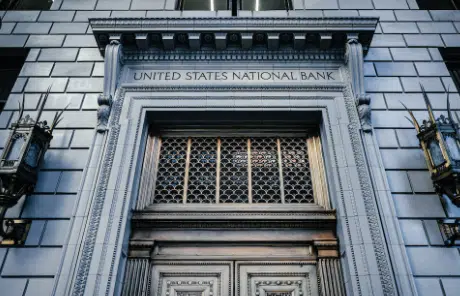TLDR
This comparison article will explore the world of crypto-friendly banks, exploring different types and evaluating their pros and cons.
We will highlight the integration of cryptocurrencies with traditional banking services, offering benefits such as more accessible access to digital assets, lower transaction fees, and faster transfers.
It will also explore potential risks, including hacking vulnerabilities, complexity in managing private keys, and liquidity challenges with crypto-friendly banks. It will help you decide when to choose the right bank for your crypto investment needs.
We have researched and compiled the ultimate list of crypto-friendly banks for our users. Sit back and relax and enjoy the process.
Introduction
Crypto-friendly banks go beyond the traditional banking model, embracing digital currencies and crypto businesses with open arms.
These innovative banks provide crypto firms with various services, from crypto trading and exchange integration to insurance for crypto businesses.
Some even offer specialized credit and debit cards that provide cashback rewards for purchases made in Bitcoin. With these forward-thinking institutions, you can experience a seamless blend of traditional banking and the exciting world of cryptocurrencies.
What is crypto banking?
Crypto-friendly banks are revolutionizing the financial landscape by combining traditional banking services with crypto offerings.
In the past, navigating between conventional banking and the blockchain required detours, but now, bank accounts and debit cards seamlessly integrate with crypto exchanges.
Interestingly, this integration unlocks exciting possibilities for those well-versed in the crypto space. It means easy access to web3, DeFi, and NFTs, faster settlement times for crypto transactions, and swift transfers to friends.
The convergence of conventional banking and the burgeoning world of digital assets is a trend set to continue. As demonstrated by Kraken’s acquisition of a Wyoming bank charter, the path is paved for legitimate exchanges to establish partnerships with established banks like Coinbase.
How do crypto-friendly banks work?
To bridge the gap between cryptocurrencies and traditional finance, crypto-friendly banks have emerged as game-changers in the financial industry.
These institutions enable customers to seamlessly transact between cryptocurrencies and fiat currencies, all while enjoying reduced transaction fees.
Unlike other banks, they facilitate easy, cost-effective transfers between wallets and exchanges by integrating cryptocurrencies. Such features ensure that users can effortlessly diversify their portfolios and more conveniently embrace the exciting world of digital assets.

Why and who should use banks that accept crypto?
Crypto-friendly banks offer the same services as traditional crypto exchanges, allowing users to buy, sell, and transfer crypto.
The advantage of closely intertwining banking and crypto functionalities is the added security of an FDIC-insured bank account and reduced processing time within the banking system. However, crypto trading fees on banks may be higher than dedicated exchanges.
Some individuals may treat exchanges like Coinbase as their crypto bank, leveraging features like a direct deposit to purchase crypto from their paychecks. While this may seem appealing, it needs more insurance and control than traditional banks.
Exchanges are generally not insured, which poses a risk of potential fund loss and limits the ability to time the market effectively.
Yet, opening an account with a crypto-friendly bank can be advantageous for those fully immersed in the crypto lifestyle. If digital assets hold significant value in your portfolio or frequently engage in crypto transactions, adding one of these banks to your financial toolkit can prove beneficial.

Types of crypto-friendly banks
Just like traditional banks, there are numerous types of crypto-friendly banks. Each offers a diverse set of services.
Digital-only crypto banks
Digital banking revolutionizes traditional banking services by offering convenient online solutions. Unlike regular financial institutes, digital banks only have physical branches for in-person services if necessary.
To understand digital banking more easily, compare it with the processes involved in traditional banking. Traditional banks often involve bureaucratic hurdles for customers, including extensive paperwork, in-person visits for specialized services, and the requirement of pay slips.
However, digital banking eliminates the need for these cumbersome procedures. Customers can use smartphones and other devices instead of paper forms and branch visits to manage their banking activities.
Establishing one’s identity to open an account with a modern bank can be efficiently accomplished through video calls, typically requiring only a passport. Moreover, digital banks provide 24/7 customer support through chat, ensuring continuous assistance.
Most services are conveniently accessible within banking apps, websites, or other ways, offering users seamless control over their financial transactions.
Pros
- Fast and secure operations.
- 24/7 customer support for users.
- Ease of use and accessibility.
- Cost-effective banking services.
Cons
- Service interruptions due to internet issues.
- Security risks and vulnerabilities.
- Limitations of lending, deposits, and other services.

Crypto investment banks
Crypto-friendly investment banks are financial institutions that specialize in providing investment services tailored to the cryptocurrency industry’s needs. These banks serve as intermediaries in large and complex financial transactions within the crypto space.
While traditional investment banks primarily focus on IPOs and corporate mergers, crypto-friendly investment banks cater to the unique requirements of the cryptocurrency market.
Popular investment banks, including JPMorgan Chase, Goldman Sachs, and Morgan Stanley, already provide cryptocurrency services for high-value clients. Recognizing the potential of digital assets, these banks have established divisions dedicated to meeting clients’ investment needs in the crypto industry.
By embracing the crypto ecosystem, these crypto-friendly investment banks aim to provide specialized financial advice, brokerage services, and investment opportunities to individuals, startups, and institutional clients in the cryptocurrency market.
They play a crucial role in facilitating crypto-related transactions and helping clients navigate the evolving landscape of digital assets.
To put it in a nutshell, crypto-friendly investment banks combine the expertise of traditional investment banking with a focus on the unique requirements of the cryptocurrency industry. They are trusted partners for individuals and businesses seeking comprehensive cryptocurrency investment solutions.
Pros
- Access to experienced professionals for investment.
- Diverse opportunities in the crypto space.
- Operate within regulatory frameworks.
- Providing security and legal compliance.
Cons
- Charge higher fees.
- Limiting access for smaller investors with strict requirements.
- Centralized control of customer assets.

Crypto central banks
Crypto-friendly central banks operate similarly to traditional ones but focus on accommodating cryptocurrencies and emerging digital assets.
These central banks recognize cryptocurrencies’ growing influence and potential and are exploring the development of Central Bank Digital Currencies (CBDCs). CBDCs are digital currencies issued and regulated by central banks, serving as a digital representation of a country’s fiat currency.
They aim to blend the advantages of digital assets, like speedy and streamlined transactions, with the stability and regulatory supervision offered by central banks.
By adopting crypto-friendly policies, these central banks seek to promote innovation in the financial sector, enhance financial inclusion, and provide a secure and regulated framework for digital transactions. They may collaborate with crypto and blockchain technology companies and industry experts to develop and implement CBDCs.
While the concept of CBDCs holds potential advantages, including improved payment systems and increased financial transparency, there are also challenges to consider.
These challenges include data privacy concerns, robust security measures against cyber threats, and ensuring equal access to digital financial services for all individuals, including those without access to technology.
Pros
- Promotion of innovation in the financial sector.
- Enhanced financial inclusion through digital assets.
- Potential for improved payment systems and financial transparency.
Cons
- Data privacy and security concerns.
- Lack of anonymity when trading crypto.
- Strict regulatory compliance.

Crypto corporate banks
Crypto-friendly commercial banks specialize in delivering banking services tailored to businesses involved in the crypto space. These banks understand crypto companies’ particular needs and challenges, offering various services to support them.
In addition to traditional business banking services, like credit facilities and cash management, crypto-friendly commercial banks also provide specialized services for crypto businesses.
Some of the commercial services offered by these banks include facilitating crypto transactions, offering custody solutions for digital assets, assisting with regulatory compliance related to cryptocurrencies, and providing advisory services specific to the crypto industry.
Prominent examples of crypto-friendly commercial banks include JPMorgan Chase and Bank of America. They have recognized the crypto market’s growing importance and adapted their services to cater to businesses in this space.
Pros
- Specialized services for crypto businesses.
- Understanding of the unique needs and challenges of the crypto space.
- Assistance with regulatory compliance for cryptocurrencies.
Cons
- Limited availability and adoption of crypto-friendly banking services.
- Higher fees compared to traditional banking services.
- Reliance on the stability and security of the crypto industry.

Crypto retail banks
Crypto-friendly retail banks, catering to the general public, provide convenient access to a wide range of traditional banking services alongside cryptocurrency-related offerings.
Customers can enjoy the convenience of their checking and savings accounts, loan and mortgage services, and financing options for various needs, all while seamlessly integrating cryptocurrency transactions.
Crypto retail banks broaden the investment horizon for individuals by providing opportunities to engage in traditional financial instruments, like certificates of deposit (CDs), mutual funds, and digital assets such as cryptocurrencies.
This allows customers to diversify their investment portfolios and explore potential growth and returns avenues. By offering multiple investment options, these banks empower users to take advantage of traditional and emerging financial markets, catering to their diverse investment preferences.
With their focus on customer satisfaction and financial inclusivity, crypto-friendly retail banks aim to bridge the gap between traditional banking and the growing world of cryptocurrencies.
Pros
- Access to a wide range of investment options.
- Diversification opportunities for investment portfolios.
- Convenience and accessibility through online platforms.
Cons
- Volatility and risk of cryptocurrencies.
- Regulatory uncertainty surrounding cryptocurrencies.
- Limited availability of traditional banking services.

Advantages of crypto-friendly banks
Using a crypto-friendly bank offers numerous advantages, such as convenience, reliability, security, the opportunity to earn interest, and integration with cryptocurrency exchanges.
These benefits make crypto banks attractive for individuals seeking a user-friendly and comprehensive solution for their crypto-related needs. Here are a few advantages:
Convenient and User-Friendly
One significant advantage of using a crypto-friendly bank is its user-friendly interface. Unlike the complexities of wallets and peer-to-peer transactions, crypto banks offer a streamlined and intuitive experience.
You can easily access your crypto accounts, check balances, and initiate transactions through the bank’s website. This simplicity makes it more accessible to individuals new to the crypto world.

Reliability and liquidity
Banks in the crypto space offer a higher level of reliability compared to individual wallets. They typically operate with larger trading volumes, ensuring better liquidity for users.
This means that users can easily exchange digital assets with buyers and sellers, facilitating smooth and efficient transactions. Crypto banks’ reliability gives users greater confidence in managing and using their funds effectively.

Enhanced security and privacy
Security is a paramount concern in the crypto world, and crypto-friendly banks address this by offering robust security measures.
Thanks to blockchain technology, users can transfer their assets to recipients without revealing personal information. Transactions within the bank’s ecosystem are encrypted and secure, ensuring the safety of users’ funds.
With crypto banks, users can enjoy high security and privacy, as they only share information with recipients they are comfortable disclosing.
Opportunity to earn interest
Crypto banks also present the opportunity to earn interest on stored assets. Like traditional savings accounts, you can earn interest on their crypto balances yearly.
This feature allows users to generate additional digital currencies from their idle assets, allowing them to grow their crypto holdings passively.

Integration with cryptocurrency exchanges
Some crypto-friendly banks go beyond essential banking services and offer integration with cryptocurrency exchanges.
With this integration, you can transfer funds from bank accounts to an exchange, ensuring seamless purchasing of cryptocurrencies. Besides that, it helps simplify entering the crypto space and provides a hassle-free way to manage your digital assets and investments.

How to get started with crypto banks?
Considering a few factors before choosing the right crypto bank would be best.
Broad country support
To ensure reliability and accessibility, choosing a crypto-friendly bank that supports a wide range of countries is advisable.
International banks catering to clients from various parts of the world possess robust infrastructure and are better equipped to serve customers regardless of geographical location. This global reach can provide peace of mind and a seamless banking experience.
Favorable currency conversion fees
When choosing a crypto-friendly bank, looking for institutions that offer low currency conversion fees is essential.
These fees are incurred when you convert your cryptocurrencies into traditional fiat currencies such as USD, GBP, or AUD. Selecting a bank with competitive conversion rates can minimize the costs of exchanging your crypto assets.

Multi-currency accounts
Opting for a bank that provides multi-currency accounts can simplify various currencies’ management, storage, and expenditure.
With a multi-currency checking account, you can hold and transact in different currencies, making navigating the global financial landscape more convenient.
This feature proves especially valuable for individuals conducting international transactions or having diverse currency needs.

Evaluate crypto support for your desired digital assets
When selecting a bank, consider the specific cryptocurrencies you intend to invest in. Unfortunately, some crypto-friendly banks have limited support for digital assets, restricting your investment options.
Conversely, some banks offer a broader range of supported cryptocurrencies, providing greater flexibility and opportunities to diversify your crypto portfolio.

Check for crypto exchange integrations.
Choosing a crypto-friendly bank that integrates with popular exchanges like Kraken can be advantageous. These integrations enable you to enjoy enhanced flexibility when investing in cryptocurrencies.
By leveraging such integrations, you can quickly transfer funds between your online bank account and the integrated exchange platform, streamlining your crypto trading activities and expanding your investment possibilities.

The disadvantages of crypto-friendly banks
Despite numerous advantages, crypto banks lack in some departments. Let us discuss these in detail.
Hacking Vulnerability
One potential disadvantage of using crypto-friendly banks is the growing risk of hacking. These banks mostly hold large amounts of digital assets, so they become tempting targets for hackers.
Cybercriminals look for any platform’s vulnerabilities to gain unauthorized access and steal funds. It is crucial to emphasize the significance of implementing sufficient security measures and maintaining constant vigilance. There have been numerous cases in recent years of platforms experiencing losses worth millions of dollars due to theft.
Complexity Challenges
Engaging with crypto-friendly banks introduces complexity that users need to navigate. Unlike traditional banking services, these banks require customers to manage passwords and private keys associated with their crypto wallets. These keys and passwords are access points to the users’ digital assets.
If a user loses or forgets these necessary details, it can end up in a permanent loss of funds. That’s why you must educate yourself about the platforms and adopt proper security practices, such as securely storing passwords and backing up private keys to mitigate the risk of asset loss.
Liquidity Limitations
Another potential drawback of crypto-friendly banks is the issue of liquidity. Some banks may need to help maintain sufficient liquidity due to high cryptocurrency trading volumes or other factors. It can be challenging for crypto holders who wish to exchange their assets with buyers and sellers.
More liquidity may result in delays, higher transaction costs, or even the inability to execute trades at desired prices. Individuals must consider liquidity when choosing a crypto-friendly bank, especially if they engage in frequent trading or require quick access to their funds.
Regulations and KYC Requirements
Cryptocurrencies operate within a rapidly evolving regulatory environment, and different jurisdictions may impose varying levels of oversight on banks offering crypto services.
Some countries have implemented strict regulations to prevent money laundering and illicit activities, which may lead to stringent KYC procedures for customers.
This can involve providing personal identification documents, proof of address, and other verification processes. Hence, you first need to understand the regulatory framework and compliance obligations associated with crypto-friendly banks, as these requirements can impact the privacy, anonymity, and convenience users seek in cryptocurrency transactions.

Summary
Crypto-friendly banks have emerged as pioneers in embracing and supporting digital currencies and crypto enterprises. These banks go beyond merely providing crypto trading services or facilitating integration with popular exchanges like Binance or Kraken.
These innovative banks have expanded their offerings to cater to the specific needs of the crypto space. Besides, they provide insurance options tailored for crypto businesses, providing much-needed protection in this evolving landscape.
Some Bitcoin-friendly banks have also introduced credit and debit cards that offer enticing incentives, such as cashback rewards on BTC purchases via debit card.
These progressive initiatives from crypto-friendly banks demonstrate their commitment to fostering the growth and adoption of cryptocurrencies, providing customers with a seamless and rewarding crypto-banking experience.
A crypto bank offers services specifically tailored to the needs of cryptocurrency users. It provides a platform for managing digital assets, making crypto transactions, and accessing various financial services. These banks often integrate with cryptocurrency exchanges, provide wallet services, and offer features like earning interest on crypto holdings.
Yes, crypto banks generally require to Know Your Customer (KYC) verification from their customers. KYC is verifying identities to prevent illegal activities like money laundering and fraud. Customers are typically required to provide personal identification documents and undergo verification processes to open an account and access the bank's services.
A crypto-friendly bank differs from a traditional bank in several vital aspects. Firstly, crypto-friendly banks are specifically designed to cater to the needs of cryptocurrency users and offer services related to digital assets. It includes integrating with cryptocurrency exchanges, providing crypto wallet services, and facilitating crypto transactions.
















